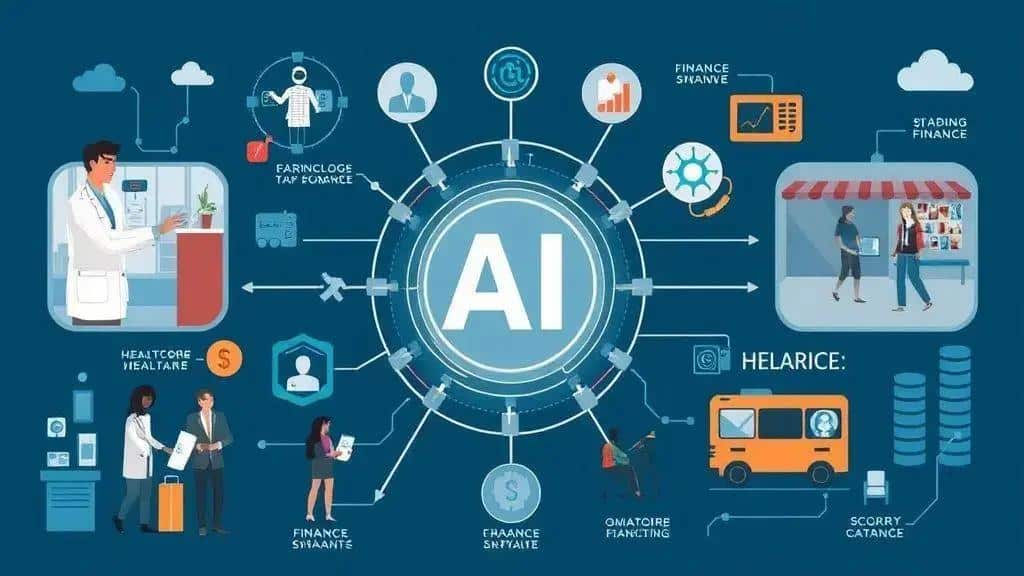Future trends in artificial intelligence you can’t ignore

The future trends in artificial intelligence will greatly impact industries by enhancing efficiency, improving decision-making, and necessitating ethical considerations to ensure responsible adoption.
Future trends in artificial intelligence are set to redefine our world. Have you considered how these advancements could change your life or business? Let’s dive into some exciting developments.
Emerging technologies transforming AI
Emerging technologies are transforming AI in remarkable ways. Innovations in computing power and algorithms are paving the way for smarter systems.
Key Technologies Shaping AI
Several technologies are at the forefront of this transformation. They enhance the capabilities of AI, allowing it to perform tasks with greater accuracy and efficiency.
- Quantum computing: Offers exponential speed improvements, enabling AI to analyze vast datasets quickly.
- Natural Language Processing (NLP): Enhances communication between humans and AI, making interactions more intuitive.
- Machine learning and deep learning: Continues to evolve, allowing AI to learn from data more effectively.
- Edge computing: Processes data nearer to its source, reducing latency and increasing response times.
As these technologies evolve, the impact on industries will be profound. For example, in healthcare, AI systems can analyze patient data faster and provide insights that lead to better treatment outcomes. This is particularly evident in diagnostic tools that leverage advanced algorithms to detect diseases early.
Another area is autonomous vehicles. By integrating AI with sensor technologies, these vehicles can navigate complex environments safely. This advancement brings us closer to a future where transportation is both safer and more efficient.
Moreover, the integration of augmented reality (AR) with AI presents exciting possibilities. Imagine AI-driven applications offering real-time assistance, enhancing learning experiences, and improving decision-making processes. The potential is vast and far-reaching.
Each of these technologies contributes uniquely to the transformation of AI, delivering benefits that can revolutionize how tasks are performed across various sectors.
Impact of AI in various sectors

The impact of AI in various sectors is profound and continues to grow. As businesses adopt AI technologies, they experience increased efficiency and improved outcomes.
Healthcare Innovations
In healthcare, AI is revolutionizing patient care. For example, AI algorithms analyze vast amounts of medical data, helping doctors make quicker and more accurate diagnoses. This leads to improved patient outcomes and more personalized treatment plans.
- Predictive analytics: Helps forecast patient needs.
- Robotic surgeries: Allow for more precise operations.
- Telemedicine: AI enhances remote patient monitoring.
Another remarkable effect of AI is seen in finance. Financial institutions are using AI for risk assessment and fraud detection. Algorithms can identify suspicious activities in real-time, protecting both the bank and its customers. The ability to process large datasets swiftly gives banks an edge in decision-making.
In the retail sector, AI helps improve customer experiences through personalization. Online stores analyze shopping habits to recommend products tailored to individual preferences. This not only boosts sales but also nurtures customer loyalty.
Transportation is another field where AI plays a significant role. With autonomous vehicles on the rise, safety and efficiency in transportation are improving. AI systems control navigation, traffic management, and logistics, making travel safer and more convenient.
Each of these examples illustrates how AI is not just a trend but a driving force shaping the future of industries across the globe. The continued integration of AI will likely lead to even greater advancements.
How businesses can prepare for AI trends
Understanding how businesses can prepare for AI trends is crucial for maintaining a competitive edge. As AI continues to evolve, companies need to adopt strategic approaches.
Investing in Training and Development
One of the first steps is investing in training for employees. Providing education on AI tools and technologies enhances workforce skills, ensuring they are equipped to leverage new advancements. Training programs can cover basic AI knowledge, data analysis, and specific applications relevant to the business.
- Workshops: Offer hands-on learning experiences for staff.
- Online courses: Provide flexible learning options.
- Collaboration with AI experts: Bring in professionals to share insights.
Another critical aspect is to develop a robust data strategy. As AI relies heavily on data, businesses must ensure they gather, store, and analyze data effectively. This means implementing the right tools for data management and analysis. Businesses should focus on quality over quantity, ensuring the data used is accurate and relevant.
Additionally, fostering a culture of innovation within the organization can drive AI adoption. Encouraging employees to share ideas and experiment with AI technologies can lead to new applications that benefit the company. When team members feel empowered to innovate, they are more likely to embrace changes.
Finally, businesses should actively monitor AI developments in their industry. Staying informed about advancements enables companies to anticipate changes and adapt accordingly. This can involve participating in industry conferences, subscribing to relevant publications, or joining professional organizations focused on AI.
Ethical considerations in AI advancements

Addressing the ethical considerations in AI advancements is vital for ensuring that technology benefits society responsibly. As AI systems become more integrated into our daily lives, ethical challenges must be confronted.
Privacy Concerns
One major issue is privacy. AI systems often rely on large amounts of data, which can include sensitive information. It is crucial to ensure that user data is handled with care to protect individual privacy. Businesses must implement strong data protection measures and comply with regulations to prevent misuse of information.
- Data anonymization: Techniques should be used to remove personally identifiable information.
- Transparency: Users should know how their data is used.
- Data ownership: Individuals should have control over their own information.
Another ethical concern is bias in AI algorithms. If biased data is used in training, the AI may reinforce stereotypes and discrimination. Businesses need to monitor and refine their algorithms to ensure fairness and inclusivity in AI applications. Regular audits can help identify biases and correct them promptly.
Moreover, the impact of AI on employment raises questions regarding job displacement. As automation increases, certain roles may become obsolete. It is essential for companies and policymakers to work together to provide retraining opportunities for affected workers. Ensuring a smooth transition for the workforce will help mitigate negative impacts.
Lastly, accountability in AI decision-making is crucial. When AI systems make decisions, it is important to understand how those decisions were reached. Clear guidelines and standards should be established to ensure accountability. This way, if an AI system causes harm, there will be a clear understanding of who is responsible.
In conclusion, understanding the impact of AI is essential for businesses and society. As we move forward, the ethical considerations around AI advancements must be a top priority. By fostering transparency, investing in training, and addressing biases, we can create a future where AI benefits everyone. Collaboration among industry leaders, policymakers, and the public is crucial in shaping responsible AI technologies. Together, we can harness the potential of AI while ensuring it aligns with our values and enhances our lives.
FAQ – Frequently Asked Questions about AI Advancements
What are the main ethical concerns related to AI?
The main ethical concerns include privacy issues, potential biases in algorithms, and the need for accountability in AI decision-making.
How can businesses ensure data protection when using AI?
Businesses can ensure data protection by implementing strong security measures, anonymizing personal data, and being transparent about data usage.
Why is employee training important in adopting AI technologies?
Employee training is crucial as it equips the workforce with the necessary skills to effectively use AI tools, thus maximizing their potential benefits.
How can bias in AI systems be addressed?
Bias can be addressed by regularly auditing AI algorithms, using diverse training data, and ensuring a multi-disciplinary team is involved in the development process.





